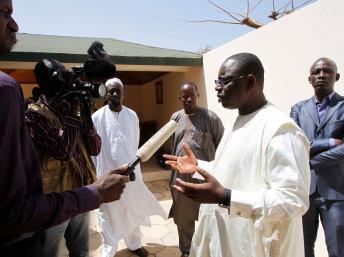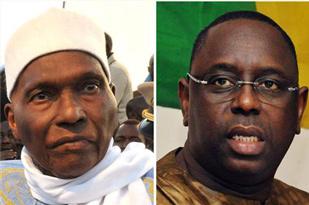Towards a second round in Senegal elections: Teacher versus disciple – By Alpha Diedhiou


Abdoulaye Wade will take on his main challenger - Macky Sall - in the second round of Senegal's Presidential election.
After weeks of violent protests against The Incumbent’s (President Abdoulaye Wade) third term the Senegalese have finally cast their votes in peace. A peaceful polling day highlights the democratic maturity of the Senegalese people who understood that casting a vote is the ultimate channel through which citizens can express their voice, more powerful than protests and demonstrations.
If Senegal has already experienced a first democratic transfer of power in 2000, a second transition would come to epitomise a real move towards democratic consolidation. Equally importantly, this would come to reflect the political development of an emerging African society, one that does not accept being failed repeatedly. Such is the significance of this year’s presidential elections from the perspective of many informed Senegalese.
It is to be hoped that Senegal will now provide further evidence to support the idea that a new Africa is emerging – an Africa where transitions of power can happen without bloodshed, and where politics is no longer regarded as a zero sum game.
It is important to stress that The Incumbent has long believed in his chances to obtain a winning majority of more than 50 percent in the first round. Two days after the vote, the tone has changed dramatically, and there seem to be more cautious and measured statements coming from his camp. Maybe he underestimated his former student, opposition candidate Macky Sall, one that he tried to groom to replace him as leader of the PDS party, if not as president. What is certain is that he has come to the realisation that the contest will be close, and the student has matured. What also became clear from early figures is that Mr Wade is not dead and buried yet. He has already managed to register clear cut victories in several parts of the country, suggesting that he is more than capable of springing a surprise victory in the second round.
The reasons why Wade managed to secure so many votes pertain to two main factors. Firstly, he was able to focus on campaigning while most of opposition leaders clung too long on seeing to it that he did not run for a third term. In short, they protested more than they campaigned. Secondly, Mr Wade operates within established political machinery, the PDS party, which has operated in the Senegalese political arena for a very long time. In this regard, many Senegalese chose to stick to the known rather risk voting for a new man. Not that “˜the unknown’ here is especially new – the majority of opposition leaders are either former ministers of previous Wade governments or former statesmen from the PS party, which was democratically deposed by Wade in 2000. In a sense, it seems that many Senegalese did not trust what they see as PDS renegades or people from a party that failed them for forty years.
Macky Sall – the man most likely to contest the second round with Mr Wade – was Prime Minister in Wade’s previous governments and also as President of the Senegalese legislature. In this regard, he is a seasoned political actor, one who not only understands PDS processes but also their weaknesses. Consequently, he is more than capable of exploiting these weaknesses. Mr Sall was able to take part in the M23 movement – made up of most opposition parties and many civil society organisations – which principally campaigned against Wade’s candidacy, but he did break away from protests in time to run a campaign worthy of its name.
Sall has also surrounded himself with other seasoned political actors. His Director of Communications, Mr El Hadj Kasse, is a former editor of Senegal’s oldest newspaper. According to the latter, Mr Sall started working on his campaign in 2008 by touring the country to meet and consult with various constituencies. From these consultations and meetings, Sall and his team were able to draw up both a campaign strategy and a coherent social project for the purposes of the current elections, and beyond. From these consultations, Senegalese people helped define three main priorities: health, clean water, and the improvement of national and inner city roads.
It is not surprising therefore to see Mr Macky Sall launch a serious challenge to Wade’s attempt to secure a third term. However, taking Wade to a second round is just a minor success. His biggest challenge will be convincing Senegalese people who did not bother to vote in the first round that his strategy is more viable than Wade’s in 2000. Wade previously campaigned on these promises in 2000: improving both physical and social infrastructure, as well as employment generation. The core elements of Sall’s campaign thus far pertained to cleaning up Senegalese politics with more transparency and greater integrity. This resonated well in many Senegalese quarters, especially as he is one of the few who dared summon The Incumbent’s son, Karim Wade, to a parliamentary hearing while President of the National Assembly.
For Wade, the second round will be difficult to manage after twelve years in power, which many regard as a failure. He has created a good deal of physical infrastructure (building a new airport, a motorway and overhauling the port of Dakar). If this type of infrastructure is critical to investment attraction in the medium to long term, the short term priorities of many Senegalese were relegated to the background. Critical for both, however, is the issue of energy insecurity. Whoever wins the second round will need to act fast on the recurrent power cuts, which have plagued households and businesses alike for the past few decades. It would seem that energy infrastructure is a more sensible development in a country that is not endowed with large reserves of extractive resources as many of its West African neighbours.
Alpha Diedhiou is a Political Analyst and Lecturer at Birkbeck College, University of London.





